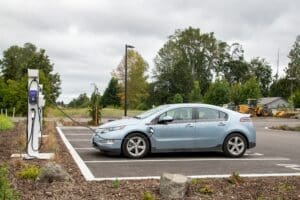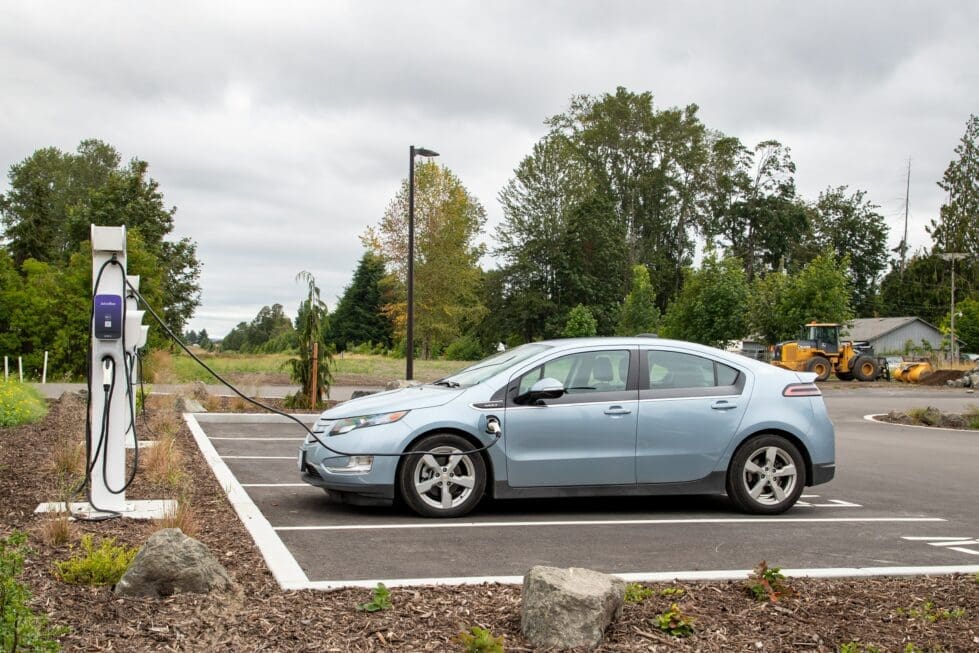
Several electric vehicle bills have passed through a House committee despite Republican opposition. Photo by Cindy Shebley/Pexels.
Several energy-related bills waltzed through the House Resources and Energy Committee Tuesday, despite Republican opposition.
Senate Substitute 1 for Senate Bill 7, sponsored by Sen. Stephanie Hansen, D-Middletown, would update the responsibilities of the State Energy Office to include developing the State Energy Plan, the state’s Climate Action Plan, and transitioning Delaware towards more renewable energy.
The bill is a change from Senate Bill 7 that the Senate Environment, Energy & Transportation Committee approved on May 16, which only mentioned supporting clean energy, not transitioning towards it, and didn’t bring up the state’s Climate Action Plan.
It passed the committee with four votes in favor and four votes on its merits. It now heads to the House Appropriation Committee.
Senate Substitute 1 for Senate Bill 103, sponsored by Sen. Sarah McBride, D-Wilmington, would require new single-family homes with building permits issued after Jan. 1, 2024 and multi-family homes with an application for final site plan approval submitted after Jan. 1, 2025 to have electric vehicle charging stations.
The bill is a change from Senate Bill 103 that the Senate Environment, Energy & Transportation Committee approved on May 10, which had included a minimum of 40 amperages and 208/240 voltage in the definition of an electric vehicle capable parking space, which was removed from the most recent bill.
It passed the committee with six votes in favor, one vote on its merits and one vote against. It now heads to the House floor for consideration.
Hansen said that Senate Substitute 1 for SB 7 is needed to help the state smoothly transition to more renewable energy.
“We need the government structure to provide the oversight and the coordination, the public accountability and the transparency, during this transition,” Hansen said. “This bill sets the stage to meet that challenge by identifying and reclassifying five existing full-time employees with that necessary funding switching over to the State Energy Office.”
Related Story: Senate committee moves along energy office bill
In the fiscal note for the bill, it will cost the state $333,278 in ongoing funding and $21,000 in one-time funding for the 2024 fiscal year, $447,786 in ongoing funding for the 2025 fiscal year, and $456,438 in ongoing funding for the 2026 fiscal year.
Rep. Richard Collins, R-Millsboro, said that he hopes the bill doesn’t throw the state off a cliff.
“Modern energy has provided the world with the greatest benefits, lifespan, health, environment, that we’ve ever seen,” Collins said. “Now we’ve decided through government action, we’re going to do away with many of the benefits in the hopes that this new technology will work out.”
Rep. Ronald Gray, R-Bethany Beach, said that he’s concerned about the state’s ability to meet its energy needs.
“Similar to Rep. Collins, I am really concerned about the energy grid,” Gray said. “You read about Europe and what’s happened to them … and it’s a real concern. When the wind doesn’t blow or the sun doesn’t shine, our renewable ones are not gonna provide the energy that we have.”
Rep. Jeff Hilovsky, R-Millsboro, said private businesses would do a better job handling energy than the government.
“What I see here is more government,” Hilovsky said. “I wonder if this is the right thing to do … I’m disappointed in the almost shunning of the private sector for the government.”
Hansen responded that private consulting companies have been involved in the groups guiding the legislation.
“We have representation from the 11 utilities that are on there,” Hansen said. “We have representation from the conservative business groups as well as the environmental group…They themselves see that the development of a broader workforce really depends more on the ability to work together.”
Perennial General Assembly public commenter Robert Overmiller spoke against the bill,
“Al Gore said we would have no more snow after 2013 and the polar ice caps would be gone. I think he was a little bit wrong,” Overmiller said. “Dr. Greta Thunberg said that this month, of this year, the world was coming to an end if fossil fuel was gone. This is all false science. This is all theory that has no support behind it. It’s time that this stuff stops.”
Dustyn Thompson, director of the Delaware Chapter of the Sierra Club, said the bill should pass so Delaware doesn’t fall behind.
“We need to be charging forward on all fronts and ensure that our Energy Office has the staff and resources they need to create our next energy plan, to look at the advancement and in the areas mentioned previously, and to really align our energy priorities to realize the gains that have been made in the past decade,” he said.
Related Story: Bill on EV chargers in new homes passes Senate committee
Collins said he was against Senate Substitute to SB 103 because of the dangers of electric vehicles.
“There have been absolute issues of fires and these things if they catch fire inside your garage, if it’s attached to your house, your house and gone and maybe you with it,” Collins said. “I honest to goodness believe that demand will drive this if people want these things.”
Rep. Krista Griffith, D-Fairfax, responded that gas vehicles catch fire at a higher rate than electric vehicles.
“One fact I have is data from the Bureau of Transportation statistics, which shows that gasoline powered cars are involved in about 1,530 fires per 100,000 vehicles sold,” Griffith said. “Compare that to electric vehicles which just saw 25 fires per 100,000 sold. So let’s make sure that we’re using facts before we’re using hyperbole.”
Rep. Charles Postles, R-Milford, asked what will limit anyone from using a charging station meant for people that live in a multi family unit.
Griffith said in response that it’ll be up to individual apartment owners to figure out how to regulate who gets to use the charging stations.
“We’ll leave it up to those condominium associations and developers to figure out where the visitor parking is and where the homeowner parking is,” Griffith said.
Brian Boyle, senior policy director with New Castle County, said they support the bill because it would encourage renters to get electric vehicles.
“Renters are less likely to buy electric vehicles in part because they might not have a place to charge at home,” Boyle said. “So this requirement will help shrink that gap.”
New Castle County implemented an ordinance last July that requires new homes to be equipped to handle electric vehicles, and Boyle said around 725 homes have been built with that requirement since then.
The committee also voted on House Bill 12, sponsored by Rep. Sophie Phillips, D-Christiana, which would set up a rebate program for new and used electric vehicles and plug-in hybrids, using $2 million in funding from the Regional Greenhouse Gas Initiative.
The bill would give a $2,500 rebate for electric vehicles and a $1,000 rebate for plug-in hybrids, with the available funding enough to cover up to 4,000 electric vehicles and 1,000 plug-in hybrids.
While the bill applies to vehicles costing no more than $60,000, Phillips has put forward an amendment to lower that to $50,000.
Unlike the two Senate Substitute bills, HB 12 didn’t receive any opposition from Republicans and was approved with six members in favor and three on its merits.
A fiscal note is not required for Senate Substitute for SB 103, which has 14 additional sponsors and cosponsors, all Democrats.
Senate Substitute for SB 7 has 16 additional sponsors and cosponsors, all Democrats.
Share this Post




